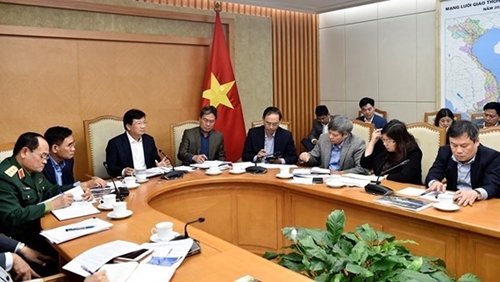The Deputy PM addressed a meeting in Hanoi on February 12 on the results of the feasibility study for the first phase project, which was jointly carried out by the Airports Corporation of Vietnam and a joint venture comprising of firms from Japan, France and Vietnam (JFV) from June 2018.
On June 2, 2018, the JFV signed a contract with Heerim Architects and Planners on the designing of the airport’s terminals.
    |
 |
|
An overview of the meeting |
According to the consultation agency, detailed designs of the project will largely be completed by April 2019. Connectivity methods and investment plans were also proposed.
Deputy PM Dung recognized the efforts of the Ministry of Transport and relevant agencies, as well as the People’s Committee of Dong Nai in ground clearance and the project’s implementation.
He stressed the need to build the airport to the highest standards so as to ease the overloading of Tan Son Nhat International Airport in Ho Chi Minh City, turning Long Thanh into an international and regional aviation transit center.
He asked for the careful calculation of transport demands and the division of exploitation among airports in the country and region, thus optimizing the efficiency of the project.
The airport should apply modern technology and ensure safety, convenience, quality, efficiency, defense, security, and environmental protection criteria, he said.
The Deputy PM also suggested the mobilization of capital for the project from private businesses, minimizing the use of State budget.
The Long Thanh International Airport has a total area of more than 5,580 ha, spreading across six communes in Long Thanh District, the southern province of Dong Nai. It is set to have a total investment of VND 336.63 trillion (USD 14.8 billion), with construction divided into three phases.
In the first phase, a runway and a passenger terminal, along with other supporting works, will be built to serve some 25 million passengers and 1.2 million tons of cargo each year. This phase is hoped to be finished by 2025.
In the second phase, an additional runway and passenger terminal will be constructed to serve 50 million passengers and 1.5 million tons of cargo per year.
After the third phase, the airport will be able serve 100 million passengers and 5 million tons of cargo annually.
Source: VNA